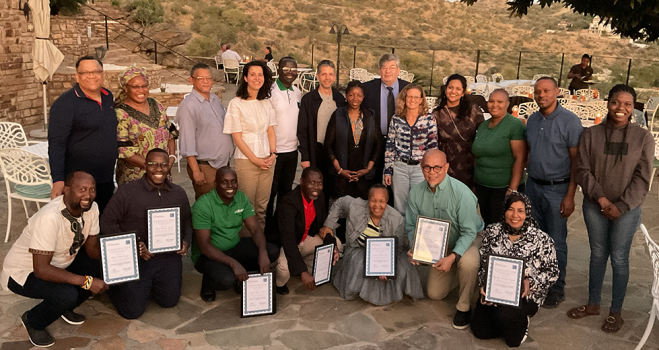Two “generations” of GRAPE activists gathered the first week of May in Windhoek, Namibia, to sharpen and deepen the advocacy campaigns in Kenya and South Africa, strengthening them for active implementation.
The GRAPE—Global Reformed Advocacy Platforms for Engagement—program was established by the World Communion of Reformed Churches (WCRC) to address the enormity and complexity of the unjust economic situation coupled with the climate crisis by growing networks of advocates in church and civil society.
“GRAPE has started with two projects in Kenya and South Africa that demonstrate the critical need of bringing together church leaders with civil society activists and policy experts to work for social justice and to harness that force to implement change before it’s too late,” said Muna Nassar, WCRC executive secretary for mission and advocacy.
In Kenya, the GRAPE team will work with the government and various stakeholders to ensure that by 2028 each person is guaranteed 50 litres of clean and safe drinking water or equivalent cash compensation.
In South Africa, the GRAPE team has joined forces with the national campaign for the introduction of a universal basic income grant to all individuals between the ages of 18 and 59 by 2028.
In Namibia, the first round of GRAPE trainees of 2023 met with newly selected participants. For each of its first five years, a new “school” of trainees are selected, building on the work done by previous participants, thus expanding the platforms of engagement. Graduation certificates were also awarded to the first group.
A crucial aspect of the training was learning more about the links between the climate crisis and the advocacy campaigns. This was underlined by the challenge the Kenyan participants had in reaching their airport after devastating floods hit the country.
The South African team faces a historic election at the end of this month and is utilizing it to bring the topic of a Basic Income Guarantee into the churches and public domain.
“The floods and loss of lives and livelihoods in Kenya due to the climate crisis and the uncertainties and growing poverty and inequality in South Africa with an increasingly weakened state can easily lead to despair,” said Claudia Haarmann, a project leader for the Economic Policy Research Institute of South Africa (EPRI), and a GRAPE trainer. “Nevertheless, the workshop received inspiration from theological reflection on how to give hope in this world, by aiming for the ‘foolishness’ of our faith of not giving up but working for tangible change.”
GRAPE is made possible with support from Brot für die Welt and Otto per Mille.


